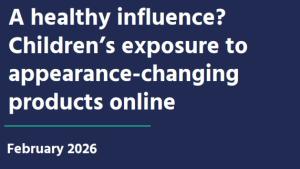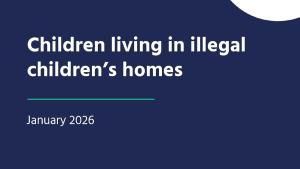This report should not have to exist. Shining a light on children’s experiences of poverty in 2025, in one of the wealthiest countries in the world, should not be necessary.
And yet, the findings in this work highlight real hardship; an almost-Dickensian level of poverty facing some children in England today. After four years as Children’s Commissioner and as a teacher and headteacher before that, few things truly leave me speechless – but the evidence from children in this report gives voice to a crisis that cannot be ignored.
Children do not talk about poverty as an abstract concept. They talk in simple but powerful terms about how it feels to not have enough money to do the same things as their friends, or to feel a sense of shame at being seen as ‘lesser’. Children should not be ashamed of their family’s financial situation, instead, it’s society at large and decision makers that should be ashamed of the fact that children don’t have enough money.
For this research, they spoke with candour about things that most people would consider basic, but which for them are out of their reach: a safe home that isn’t mouldy – or full of rats, a bed big enough to stretch out in, basic food like bacon, a place to do their homework, having the heating on, privacy in the bathroom and being able to wash, having their friends over, not having to travel hours to school, or having a local park to play safely in where the grass isn’t overgrown and unusable.
One 11-year-old boy told my team that when his family had to rely on food packages, the food was mouldy and out of date, “I know I’m poor but I’m not going to eat mouldy food.”
Most painfully, the children my team and I spoke to for this report spoke about the shame that comes from knowing you have less. Sometimes this came from other people’s responses, but often it was because of the tangible impact poverty has on their daily lives – and the knowledge that it may also have an impact on their future.
Since becoming Children’s Commissioner in 2021, I have been struck by the way that children talk about their family lives across a range of areas. They are highly aware of the nature of their challenges, and of their parents’ worries – issues that were traditionally seen as ‘adult’ concerns are now also felt by the youngest in society.
That’s why we need solutions that reflect and respond to children’s experiences and reduce the shame too many told me they feel about their circumstances. These need to consider the challenges some groups of children experience, including those who have been in care, who so often are expected to manage housing or transport costs without appropriate support.
These solutions must break the link, once and for all, between children’s backgrounds and their opportunities, by allowing them to grow up in communities that are safe, supportive, and aspirational.
I want those making decisions about children’s lives to recognise they do not see things as singular issues that fit neatly into departments. They want services and professionals that work together, listen when they share their stories, and intervene earlier to prevent problems from worsening.
There is no quick fix to ending child poverty. The extension of free school meals to all children living in households receiving Universal Credit will help. I’m also very clear that any child poverty strategy must be built on the foundation of scrapping the two-child limit. But those measures alone will not eliminate the inequalities children growing up in financial difficulty face.
To do that, we need a new approach, one that stops sidelining children’s voices. Only by listening to children, and acting in response, will we get close to solving those problems. We have a real chance ahead of us to do that, through the government’s upcoming 10-year child poverty strategy. I am so pleased to have been asked to carry out this piece of work for the Child Poverty Unit, and optimistic that it will help shape the solutions that bring about concrete changes.
Children are bursting with practical, positive ideas – their testimonies in this report prove that beyond a shadow of a doubt.




